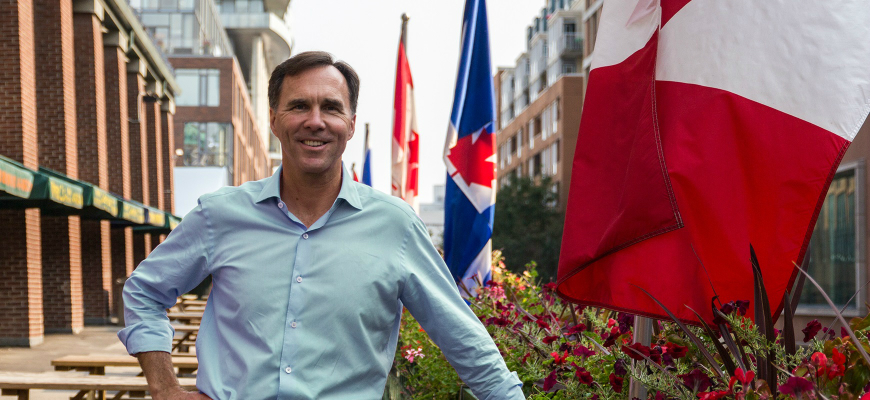
By Trevor Parry
Special to the Financial Independence Hub
Liberals are majestic creatures, always knowing what is better for the masses, and careful never to swallow a dose of their own medicine. One can conjure up the Hogwartsian image of the Little Prince and “Red” Billy Morneau stumbling hand and hand through the torch-lit catacombs of the Department of Finance, where, to their great joy, hidden behind the cobweb-covered portrait of Alan MacEachen they find a secret passage to Chamber of the Knights of the Just Society.
For it can only be a long forgotten cell of Birkenstock-wearing discredited ideologues, clutching fervently to their well-worn copies of the Carter Commission Report that have vomited forth Tuesday’s discussion paper decrying the apparent abuses perpetrated by the shareholders of private corporations.
Mr. Trudeau likely can’t spell dividend, and Mr. Morneau dare not ask his father how his tuition to the LSE (coincidentally, founded by the Fabian Socialist Society) might have been funded. For these two, along with a good portion of the Liberal caucus, are completely unaware of the sacrifices that are made to create a successful business, or create a professional carreer, and who frankly shake hands with the Holy Spirit of Hypocrisy on a daily basis.
Entrepreneurialism is a plague to Liberals
No, to the Liberal Party of Canada entrepreneurialism is a plague to be eradicated, replaced by a compliant corporate oligopoly working in symbiosis with a burgeoning civil service, and of course legions of ravenous consultants.
The Department of Finance Paper seeks to target corporate tax planning strategies that have been in place for over 30 years. Paying dividends to adult children, parents and other family members in lower tax brackets, often as a measure of generosity or as a means to pay for higher education (something Mr. Trudeau aspired to but could not achieve), multiplication of the capital gains exemption to preserve a life’s work, and realizing deferral as a means to create capital are apparently at odds with the omniscient and ubiquitous Liberal goal of “fairness.”
Tax fairness should be holding all to the lowest possible measure of taxation, not subjecting everyone to the highest. For in Trudeau’s lexicon fairness is synonymous with mediocrity. For it is an unassailable lesson of history that the fundamental precondition for the creation of economic dynamism is the creation of surplus savings and capital by the entrepreneurial class. The tax strategies that Mr. Morneau and his Office of the Five Year Plan (formerly known as the Department of Finance) targeted on Tuesday had in some tiny measure allowed for that.
In Liberal Canada economic results must be ordained, not by a higher power, or by the ability or drive of the individual but by a collection of over-entitled, mentally ossified Liberal politburo. By every measure possible; some of which arguably violate the Charter of Rights and Freedoms, in that they directly and unabashedly discriminate against familial relationships, anyone who dare exceed the rigid definition of “middle class” (which for most of the country is “lower” middle class at best) will be assaulted by the great level of an over-50% tax rate. The product of this fairness will be the corpulent rewarding of Liberal sacred cows without even the pretence of accountability.
Capital and brains will flee the country
The consequences of these policy initiatives are obvious. Capital will flee the country. This will be followed by a brain drain unseen in generations, and yes Canada your vaunted socialized medical system will teeter on the brink of collapse as many physicians realize the grass is far greener (and a great deal less expensive) on the other side of the 49th parallel. Entrepreneurs, unwilling to be punished for taking a risk on Canada, will first curtail operations, reduce their workforce, and in due course be attracted to a resurgent American economy and relocate.
Despite the daily theatrics of politics in Trump’s America it is highly likely that Congress will pass a comprehensive tax reform package, cutting corporate taxes in half, and reducing the top personal rate to 35% (which by the way doesn’t kick in until the mid $400Ks). With a tax gap that profound, the over-unionized, over-regulated and grossly overtaxed Canadian economy will find itself in a productivity gap and overall morass that will likely be generational.
Even Liberals, still smarting from the Babylonian captivity forced upon them by that “controlling monster” Stephen Harper, might harken back to the stellar cabinet of Jean Chretien (Sheila Copps, David Dingwall, John McCallum and unnamed others excepted of course) or the inspired economic courage of Paul Martin and Mark Carney and realize that steering the ship of state cannot be left to an LSE graduate and a snow board instructor whose only sense of economic reality is the account statement from their respective trust funds. My prayer, and quite frankly, our only hope … please President Trump, Make America Great Again (so that Canada might wake up from this confiscatory socialist nightmare).
 Trevor Parry is the President of the TRP Strategy Group, specializing in owner manager tax and compensation planning, executive compensation, philanthropic strategies, enhanced retirement planning and professional corporation planning. Trevor was formerly the National Sales Director of GBL, a boutique actuarial consulting firm. In addition to his practice he speaks and writes extensively on financial strategy, planning and tax issues. This blog first appeared on Trevor’s LinkedIn page and is reproduced here with permission.
Trevor Parry is the President of the TRP Strategy Group, specializing in owner manager tax and compensation planning, executive compensation, philanthropic strategies, enhanced retirement planning and professional corporation planning. Trevor was formerly the National Sales Director of GBL, a boutique actuarial consulting firm. In addition to his practice he speaks and writes extensively on financial strategy, planning and tax issues. This blog first appeared on Trevor’s LinkedIn page and is reproduced here with permission.


An intelligent discussion is due on this topic. However, political views and character assassinations are not progressing the discussion.. There are other forums for opinions.
I look forward to receiving more information when it comes out, along with the discussion and planning options recommended by those in the know.
I agree with Jan. There is a lot to discuss here on what constitutes fair and efficient tax policy, but Trevor seems to prefer to rant and rave and hurl insults, so any valid arguments he puts forward get lost in the vitriol. There are good policy reasons to provide mechanisms to support entrepreneurship, but those mechanisms should be made explicit so that the costs and benefits can be evaluated. Hiding tax support for entrepreneurs through complicated tax planning strategies that are not transparent or equally available to all entrepreneurs is just bad policy.
Facts please. Name calling and nastiness are unhelpful and leave a bad taste. There may well be good reasons not to change the tax law but I certainly wouldn’t understand them from this post.